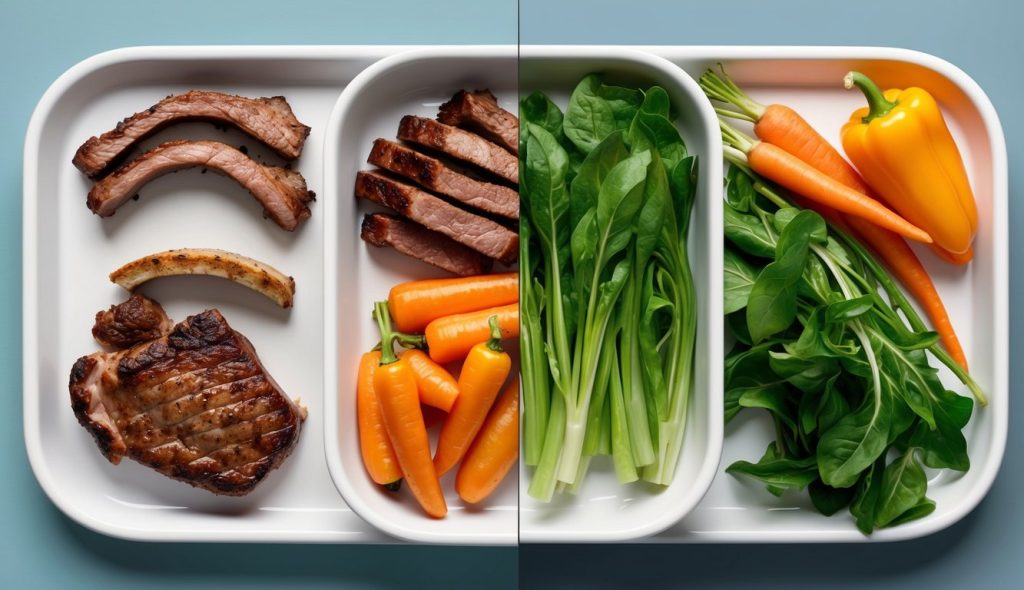The carnivore diet and vegan lifestyle represent opposing ends of the dietary spectrum, yet some individuals seek to combine elements of both approaches. This unconventional fusion aims to harness potential benefits while navigating ethical and nutritional challenges.
Vegans interested in incorporating aspects of the carnivore diet can focus on high-quality plant-based protein sources and healthy fats while maintaining their core ethical values. This modified approach may involve carefully selecting animal-sourced nutrients through supplementation or ethical alternatives, without consuming actual animal products.
By exploring this unique dietary perspective, individuals can gain insights into different nutritional philosophies and potentially optimize their health outcomes. The intersection of these contrasting diets raises important questions about environmental impact, nutrient adequacy, and long-term sustainability.
Understanding the Carnivore Diet
The carnivore diet focuses exclusively on animal-based foods, eliminating all plant products. This approach aims to maximize nutrient intake from animal sources while potentially addressing certain health concerns.
Defining Carnivore Diet
The carnivore diet consists solely of animal products, including meat, fish, eggs, and some dairy. Advocates consume primarily red meat, with options like beef, lamb, and pork. Organ meats are often included for their nutrient density.
Fish and seafood provide variety and essential omega-3 fatty acids. Eggs are a staple due to their complete protein profile and nutrient content. Some followers include dairy products like butter or cheese, while others avoid them entirely.
Water is the primary beverage, with some including coffee or tea. All plant-based foods, including fruits, vegetables, grains, and legumes, are excluded.
Nutrition in Animal Products
Animal products offer a concentrated source of nutrients essential for human health. They provide complete proteins containing all essential amino acids necessary for bodily functions and muscle maintenance.
Fatty acids, particularly saturated fats and omega-3s, are abundant in animal foods. These play crucial roles in hormone production and brain function.
Key vitamins found in animal products include:
- B12 (crucial for nervous system health)
- A (important for vision and immune function)
- D (essential for bone health)
- K2 (supports bone and cardiovascular health)
Minerals such as iron, zinc, and selenium are highly bioavailable in animal foods, supporting various bodily processes.
Health Impacts and Risks
Proponents of the carnivore diet report benefits like improved energy levels, weight loss, and reduced inflammation. Some claim relief from autoimmune conditions and digestive issues.
However, the diet poses potential risks. The high intake of saturated fats may increase the risk of heart disease in some individuals. The absence of fiber from plant foods can impact gut health and digestion.
Long-term nutrient deficiencies are a concern, particularly for vitamins C and E, typically obtained from plant sources. The lack of dietary variety may also affect gut microbiome diversity.
The diet’s high protein content could strain kidneys in susceptible individuals. It may also increase the risk of certain chronic diseases if followed long-term without proper monitoring.
Exploring Veganism

Veganism extends beyond dietary choices, encompassing ethical considerations and health impacts. This plant-based lifestyle excludes all animal products and focuses on whole, nutrient-dense foods from plant sources.
Principles of Vegan Diets
Vegan diets are rooted in the exclusion of all animal-derived products. This includes meat, dairy, eggs, honey, and other animal by-products. The core principle is to avoid causing harm to animals for food, clothing, or any other purpose.
Vegans rely on a diverse array of plant-based foods to meet their nutritional needs. These include:
- Fruits and vegetables
- Whole grains
- Legumes and pulses
- Nuts and seeds
- Plant-based oils
Many vegans choose this lifestyle for ethical reasons, environmental concerns, or health benefits. The diet is typically high in dietary fiber, antioxidants, and phytonutrients.
Nutritional Balance and Deficiencies
While vegan diets can be nutritionally adequate, careful planning is essential to avoid potential deficiencies. Key nutrients that require attention include:
- Vitamin B12
- Iron
- Calcium
- Omega-3 fatty acids
- Vitamin D
- Zinc
Plant-based sources of protein, such as legumes, tofu, and tempeh, are crucial for maintaining muscle mass and overall health. Fortified foods and supplements may be necessary to meet certain nutritional requirements.
A well-planned vegan diet can provide all essential nutrients. However, consulting a registered dietitian can help ensure nutritional needs are met through whole foods and appropriate supplementation when needed.
Implementing the Carnivore Diet in Plant-Based Eating

Adapting carnivore diet principles to plant-based eating requires careful consideration of macronutrients, protein sources, and essential nutrients. Vegans can modify their diets to align with carnivore-inspired principles while maintaining their ethical stance.
Adjusting Macronutrients for Vegans
Vegans aiming to follow carnivore-inspired eating patterns should focus on increasing fat and protein intake while reducing carbohydrates. This shift can be achieved by incorporating more nuts, seeds, and plant-based oils into meals.
Avocados, coconut oil, and olive oil are excellent sources of healthy fats. Limiting fruit and starchy vegetables helps lower carbohydrate consumption.
A typical macronutrient ratio might aim for 70% fat, 25% protein, and 5% carbohydrates. This breakdown mimics the high-fat, moderate-protein approach of carnivore diets while using plant-based foods.
Focusing on Plant-Based Proteins
Protein intake is crucial when adapting carnivore principles to a vegan diet. High-protein plant foods become essential to meet amino acid requirements.
Key protein sources include:
- Tofu and tempeh
- Seitan (wheat gluten)
- Legumes (lentils, chickpeas, black beans)
- Hemp seeds and pumpkin seeds
- Quinoa and amaranth
Combining different plant proteins ensures a complete amino acid profile. For example, pairing rice with beans or adding nuts to a grain-based meal improves protein quality.
Incorporating Key Nutrients
Vegans following carnivore-inspired eating must pay special attention to certain nutrients typically abundant in animal products. Supplementation may be necessary to avoid deficiencies.
Essential nutrients to focus on:
- Vitamin B12: Fortified nutritional yeast or supplements
- Iron: Leafy greens, legumes, and fortified foods
- Calcium: Fortified plant milk, tofu processed with calcium sulfate
- Omega-3 fatty acids: Algae-based supplements, flaxseeds, chia seeds
Iodine can be obtained from seaweed or iodized salt. Zinc-rich foods like pumpkin seeds and cashews should be included regularly.
Substitutes for Common Carnivore Foods

Transitioning from a vegan diet to a carnivore-inspired eating plan requires finding suitable plant-based alternatives for animal products. These substitutes aim to mimic the taste, texture, and nutritional profile of meat, dairy, and eggs.
Vegan Substitutes for Meat
Legumes, tofu, tempeh, and seitan serve as protein-rich meat replacements. Lentils can be used to create hearty stews or veggie burgers. Tofu, when properly seasoned and prepared, can mimic the texture of scrambled eggs or grilled chicken. Tempeh offers a nutty flavor and firm texture, making it ideal for sandwiches or stir-fries.
Seitan, made from wheat gluten, closely resembles the texture of meat. It can be sliced, grilled, or used in stews. Jackfruit, when cooked and seasoned, provides a pulled pork-like consistency for tacos or sandwiches.
Nuts and seeds can add protein and healthy fats to meals. Walnuts or pecans, when ground, create a texture similar to ground beef for use in tacos or pasta sauces.
Alternatives to Dairy and Eggs
Plant-based milks like almond, soy, or oat milk replace dairy in most recipes. Coconut cream can substitute for heavy cream in soups or sauces. Nutritional yeast provides a cheesy flavor for sauces or as a topping.
Aquafaba, the liquid from canned chickpeas, works as an egg replacer in baking. Mashed bananas or applesauce can also replace eggs in some recipes. Silken tofu blends into a smooth consistency for creamy desserts or dips.
Avocado serves as a versatile substitute for butter or eggs in baking. Its creamy texture also works well in smoothies or as a spread. Chia seeds or ground flaxseeds, when mixed with water, create a gel-like consistency similar to eggs for binding in recipes.
Health Considerations with Meatless Carnivory

Adopting a meatless carnivore diet requires careful attention to nutritional needs. Key areas of focus include protein intake, addressing potential nutrient gaps, and maintaining digestive health.
Ensuring Adequate Protein and Fatty Acid Intake
Plant-based protein sources can provide essential amino acids needed for a meatless carnivore diet. Soy products, seitan, and certain legumes offer complete proteins. Combining different plant proteins helps create a full amino acid profile.
Omega-3 fatty acids, typically found in fish, can be obtained from algae-based supplements or foods like chia seeds and walnuts. These fats are crucial for brain function and reducing inflammation.
Protein powders derived from pea, rice, or hemp can supplement intake. A daily protein goal of 0.8-1 gram per kilogram of body weight is recommended for most adults.
Addressing Potential Nutritional Gaps
Vitamin B12 is a critical nutrient absent in plant foods. Supplementation or fortified foods are essential to prevent deficiency. A daily dose of 2.4 micrograms is typically recommended for adults.
Zinc, found abundantly in animal products, can be sourced from nuts, seeds, and whole grains. Men need 11 mg daily, while women require 8 mg.
Vitamin D may require supplementation, especially for those with limited sun exposure. A daily intake of 600-800 IU is generally suggested.
Iron from plant sources is less bioavailable than from meat. Pairing iron-rich foods with vitamin C can enhance absorption. Women of childbearing age may need up to 18 mg daily.
Improving Digestive Health
Fiber intake can be challenging on a meatless carnivore diet. Incorporating psyllium husk or chia seeds can help meet fiber needs. Aim for 25-30 grams of fiber daily.
Probiotics from fermented plant-based foods like sauerkraut or kimchi support gut health. These foods introduce beneficial bacteria to the digestive system.
Digestive enzymes may be helpful for those transitioning to a plant-heavy diet. These supplements can aid in breaking down complex plant proteins and carbohydrates.
Staying well-hydrated is crucial for digestive function. Drinking water between meals can help prevent constipation and support overall gut health.
Environmental and Ethical Implications

The carnivore diet and veganism represent opposite ends of the dietary spectrum, each with distinct environmental and ethical considerations. These choices have far-reaching impacts on sustainability, animal welfare, and global ecosystems.
Environmental Sustainability of Diet Choices
The environmental impact of diet choices is significant. Animal agriculture, especially factory farming, requires extensive land use and contributes to deforestation. It also demands substantial water resources and generates greenhouse gas emissions.
Veganism generally has a lower environmental footprint. Plant-based diets typically require less land, water, and energy to produce equivalent calories and nutrients. This efficiency translates to reduced carbon emissions and ecosystem disruption.
However, some argue that certain forms of animal husbandry, such as regenerative grazing, can benefit ecosystems. These practices may improve soil health and carbon sequestration in some contexts.
Ethics of Animal-based vs. Plant-based Foods
Animal welfare is a central ethical concern in the debate between carnivore and vegan diets. Factory farming practices often involve cramped living conditions and limited animal autonomy, raising serious ethical questions.
Veganism aims to eliminate animal exploitation entirely. This stance is rooted in the belief that animals have inherent rights and should not be used for human consumption or other purposes.
Proponents of the carnivore diet may argue that ethical meat consumption is possible through hunting or sourcing from small-scale, humane farms. This perspective emphasizes the natural food chain and human evolutionary history as omnivores.
Ultimately, the ethics of diet choices involve complex considerations of animal sentience, environmental stewardship, and personal values.
Practical Tips for a Vegan Carnivore Diet
Adopting a vegan carnivore diet requires careful planning and strategic food choices. This approach aims to mimic the nutrient profile of a carnivore diet while adhering to vegan principles.
Meal Planning and Preparation
Focus on high-protein plant sources like tempeh, seitan, and legumes. Incorporate protein powders made from pea, hemp, or rice to boost intake. Plan meals around these protein-rich foods, complementing them with low-carb vegetables.
Prepare meals in advance to ensure consistent nutrition. Batch cook protein sources and store in portioned containers. Keep quick options on hand, such as premade seitan or tofu scrambles.
Use coconut oil for cooking to add healthy fats. This mimics the fat profile found in animal products. Include avocados and nuts in moderation for additional healthy fats.
Balancing Macronutrients and Micronutrients
Aim for a high-fat, moderate-protein, and low-carbohydrate macronutrient ratio. This aligns with the typical carnivore diet profile. Target 70-80% of calories from fat, 20-25% from protein, and 5-10% from carbohydrates.
Supplement with vitamin B12, iron, and omega-3 fatty acids. These nutrients are typically abundant in animal products. Consider algae-based omega-3 supplements as a vegan alternative.
Minimize intake of refined carbohydrates and processed foods. These can disrupt the desired macronutrient balance. Instead, focus on whole, unprocessed plant foods that align with the diet’s principles.
Finding Replacements for Carnivore Cravings
Use mushrooms as a meat substitute in dishes. Their umami flavor and meaty texture can satisfy carnivore cravings. Portobello mushrooms make excellent burger patties or steak replacements.
Incorporate fermented foods like tempeh or natto. These provide a savory taste similar to aged meats. Their dense texture also mimics the mouthfeel of animal proteins.
Experiment with plant-based jerky made from coconut or eggplant. These can replicate the chewy texture of beef jerky. Look for versions seasoned with smoky flavors to enhance the meat-like experience.
Monitoring Health and Body Composition

Transitioning from a vegan diet to a carnivore diet requires careful health monitoring. Tracking key metrics helps ensure nutritional needs are met and any changes are identified quickly.
Tracking Nutrient Intake
A carnivore diet differs significantly from veganism in nutrient composition. Careful tracking of protein, fat, and micronutrient intake is essential. Use a food diary or nutrition app to log meals and analyze nutrient profiles.
Pay special attention to vitamin B12, iron, and omega-3 fatty acid levels. These are often lacking in vegan diets but abundant in animal products. Regular blood tests can help monitor these nutrients.
Consider supplementation if deficiencies arise. Consult a healthcare professional to determine appropriate dosages.
Evaluating Changes in Health and Weight
Monitor weight and body composition regularly. Use a scale and body fat calipers or bioelectrical impedance devices for accurate measurements. Track changes weekly.
Assess energy levels, digestion, and sleep quality. These factors often improve on a carnivore diet. Keep a journal to note any changes in mood or cognitive function.
Watch for potential health risks. Monitor cholesterol levels, blood pressure, and kidney function through regular check-ups. Adjust the diet if any concerning trends emerge.
Pay attention to physical performance. Strength gains and improved endurance are common on a carnivore diet. Track workout progress to gauge overall health improvements.
Psychological and Social Aspects of Dieting

Transitioning to a carnivore diet from veganism involves significant psychological adjustments and social challenges. The dietary shift impacts mental health, social dynamics, and eating habits.
The Psychological Effects of Dietary Change
Adopting a carnivore diet can profoundly affect an individual’s mental state. Some people report increased mental clarity and energy levels after switching to this diet. The sudden change in food choices may also trigger emotional responses, as eating habits are often deeply ingrained.
Many former vegans experience a period of cognitive dissonance when reintroducing animal products. This can lead to feelings of guilt or anxiety. However, some individuals find that the carnivore diet alleviates previous food-related stress or orthorexic tendencies.
The formation of a new dietary identity can boost self-confidence for some. Being part of a community with similar practices may provide a sense of belonging and support during the transition.
Navigating Social Situations
Social interactions often revolve around food, making dietary changes particularly challenging. Carnivore dieters may face scrutiny or confusion from friends, family, and colleagues, especially those who were aware of their previous vegan lifestyle.
Eating out can become more complex. Carnivore dieters may need to:
- Research restaurant menus in advance
- Make special requests to accommodate their dietary needs
- Explain their choices to dining companions
Social gatherings might require bringing personal food options or declining certain invitations. This can potentially strain relationships or lead to feelings of isolation.
Communication skills become crucial. Being able to articulate the reasons for the dietary change without becoming defensive can help maintain positive social connections. Some individuals find that their new diet sparks interesting conversations and opportunities for education.
